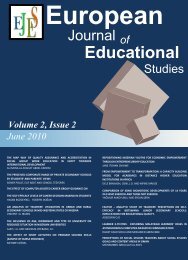Download complate issue - Ozean Publications
Download complate issue - Ozean Publications
Download complate issue - Ozean Publications
- No tags were found...
Create successful ePaper yourself
Turn your PDF publications into a flip-book with our unique Google optimized e-Paper software.
<strong>Ozean</strong> Journal of Social Sciences 2(3), 2009librarian preserves the comfort level of colleagues. But this is not always the case with classroom based facultylecturers. Most people like a university professor who is easy to talk to and get along with. However, everyoneis equally familiar with the stereotypical professor who is knowledgeable, teaches well, is scholarly renown, andalso has an ego, the size of a small planet. And there is a level of acceptance for that kind of behavior inprofessors. Students, administrators are used to deal with this type of individual. This is not the case withlibrarians. No matter how well a librarian performs a job, how many degrees or awards he or she may have, orhow many publications are on his or her resume, the librarian is expected to have a humble attitude and to befree of any touch of arrogance. Being even the slightest bit egoistical is unacceptable for librarians who are seenin service roles on campus. Patrons, other professionals on campus and colleagues in the library will not acceptit. A classroom faculty member (particularly one with tenure) can be difficult and show an attitude and still beseen as making an effort at collegiality. This is not true with a librarian. Any indication of arrogance or selfservingbehavior by a librarian will lead to that person being labeled as not being collegial and marked as beinga problem by most people on campus.The second difference is the vastly different ways that most faculty members carry out their daily duties incontrast to how librarians work each day. The faculty members teaches three or four sections of courses, holdsoffice hours or tutorials with students, advises graduate students on theses and dissertations, conducts researchand writes papers, and attends meetings. With the exception of the meetings, the faculty member has the controlof the situation when teaching, advising and writing. Literally, the only contact that some faculty members havewith faculty in their own departments is at departmental meetings and in the hallway. This explains why manyfaculty members can exhibit non-collegial behaviours and the department is still able to function and carry outmost of its duties. This is simply not true in most academic libraries. The consequences resulting from a lack ofcollegiality are more severe due to how most libraries are structured and the way that librarians work in them.No matter what role a librarian performs in the library, the work is rarely entirely self-directed as pointed out byLorenzen (2006). All aspect of library work (reference assistance, collection development, circulation,cataloguing of materials, etc) is geared towards serving the public. The different aspects of this work all interrelateand this requires librarians to exhibit collegial behaviours such as consensus building, cooperation, andplaying well together. A single librarian acting in a non-collegial manner can derail the work of everydepartment in a library and bring himself to the attention of patrons and other library employees in a negativelight fairly quickly. By this it should be realized that collegiality is important in all places on campus.However, it is required much more in the library if libraries are going to perform their roles successfully.From the above analysis, and as far as collegiality is concerned, there are lines of demarcation betweenlibrarians and faculty members, hence, the university librarians cannot be 100% grouped as academic staff.There is no doubt that they perform different academic roles in carrying out their jobs and these roles requiredifferent levels of collegiality.Collegiality: an essential ingredient in academic librariesIt is not surprising that a lot of the literature on collegiality in libraries deal with reference services. Thereference desk and related services is a time and staff intensive endeavour. But it must be known that mostacademic libraries make use of librarians who work in other parts of the library. In addition to regular referencelibrarians, a variety of subject bibliographers, administrators and librarians with other duties often assist. Add tothis support staff and student employees, and the potential for conflict and misunderstanding become significant.As pointed out earlier, it must be realized that each section cannot exist in isolation, there should be some levelsof interconnectivity among each group or department. By this, collegiality in academic library becomesinevitable; hence, it is a reality which every university librarian must practice for the smooth running of thelibrary. Collegiality must be introduced by decentralizing tasks, rotating in new employees and working oncooperative project such as book weeding. With this analysis, one can conclude that collegiality in academiclibrary is not a myth but a reality for the academic development of the library and the university as a whole. Forcollegiality to work successfully in academic library, the library manager should create an environmentconducive for effectively working together which can be regarded as first step for collegiality. This can includepromoting trust, increasing job satisfaction, making sure that everyone is included and helping librarians withunique strengths, using them when appropriate. Most importantly, the supervisor or librarian must promote thegolden rule and this is why the title of this paper, “Collegiality in Academic Library” is very appropriate. But itmust be realized that there are several pitfalls that should be avoided if we want collegiality to be verysuccessful in academic library. One of this is lack of communication which precludes maximum performance ina team; others include competitiveness, emotional conflict versus non-emotional conflict which is okay,dictatorial supervision, envy and burnout. Finally, a lack of rewards for contributing to a collegial atmospherecan also be problematic as librarians often need positive reinforcement to work collegially if they are not used toworking in that way.132
















